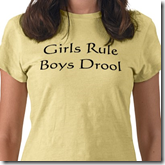A friend of mine suggested that I post this, which I wrote a couple years ago. He thought it might be a good way for readers to get to know me a little better. I have edited the original piece slightly to reflect changes in my life since I first wrote it.
____________________________________
Here are some strange things about me:
I haven’t vomited since the riding on the Music Express at Rocky Point Amusement Park in 1982.
When I was a kid, I had an imaginary friend named Johnson-Johnson, named after Johnson & Johnson’s baby powder, so my mother presumed. This imagery friend was so real that many of my childhood memories include him, as if the little boy had actually been there. I can recall my mother telling me years later that Johnson-Johnson had never existed and being stunned by this revelation.
I am able to drink more alcohol than anyone I know, and yet I have never suffered from a hangover. In fact, I feel extremely good the next morning. My friend, Scott, once referred to me as a drinking God. Despite this, I do not drink anymore. I prefer Diet Coke and apple juice. Alcohol possesses no allure for me.
Early on in my relationship with my wife, I was eating breakfast with her parents. In lieu of coffee, another drink that I do not consume, I ordered a large glass of apple juice. Her father responded with, “Apple juice? Who orders apple juice?”
Years later, I still don’t understand his question.
But I digress. Back to my strangeness.
I have never bruised. Not once. Despite having been injured more than anyone I know, including a car accident that sent me into the windshield and left me clinically dead for a few minutes on the side of a road, I escaped without a single bruise. Many other life-threatening injuries, but no bruises.
This ability to avoid bruising led me to form my own band of superheroes a while back. Sounds strange, I know, but it was a difficult time in my life. I was living alone in a cruddy little apartment above an apartment that reeked of curry. I was maintaining a serious relationship with a fictional character from a now defunct television series (which was outstanding during its one season). It was a tough time for me, so anything to take my mind off my troubles was good.
So one evening I decided to start a band of modern-day superheroes. In order to join the team, all you had to have was a superpower that was also somehow connected to a personal weakness or flaw. Like Superman. The fact that he came from the planet Krypton gave him his remarkable powers here on Earth, yet Kryptonite (a piece of Krypton) could kill him while he was on Earth.
Classic superhero motif.
I was Mr. Indestructible. I cannot be killed (having been brought back from death twice already) nor can I be bruised, yet I tend to be hurt all the time. Torn rotator cuff. Bad knees. Concussions. You name it. Strength and weakness tied together. Get it?
My friend, Bengi, was Ocular Man, since he has 20/10 vision and can see anything from about a mile away. But he is so frightened about getting water in his eyes that he has to wear a hat with a brim during a rainstorm.
My friend, Shep, was Mediocre Man, since he can do just about anything, but he can’t do anything exceptionally well.
There were other contenders for a spot on the team, including my wife, Elysha. She can identify any song and artist within three seconds of hearing it. It’s freakish how quick she is. And her musical knowledge ranges from the Ink Spots to the Beastie Boys.
I sometimes wonder if she’s some kind of musical-identification savant.
If Elysha had made the team, her weakness could have been her terrible sense of direction (unfortunately, this does not tie in well with musical identification). She once drove for an hour across Connecticut to the border with New York, stopped off at an exit for a coffee, gotten back on the highway, and driven almost all the way back home before realizing that she is headed in the wrong direction.
There was an evening years ago when she headed for the restaurant’s kitchen, thinking it was the exit, even though the door that we had entered (and would presumably exit) was in plain view of our table.
Still, I wouldn’t change a thing about her.
You may be wondering what the purpose was in forming this band of superheroes (other than to distract me from my misery).
That’s easy.
We planned on battling our evil nemesis, Gary, also my friend. I thought that Gary would play the role well. He seems kind of evil and he’s easy to anger. Getting him to battle us wouldn’t be difficult, I surmised.
Alas, nothing ever became of my band of superheroes. Elysha entered my life and my sanity returned. But I still think about those brave souls, ready to give their lives in order to fight against evil Gary, with the fate of the world in the balance.
Those were good days.









